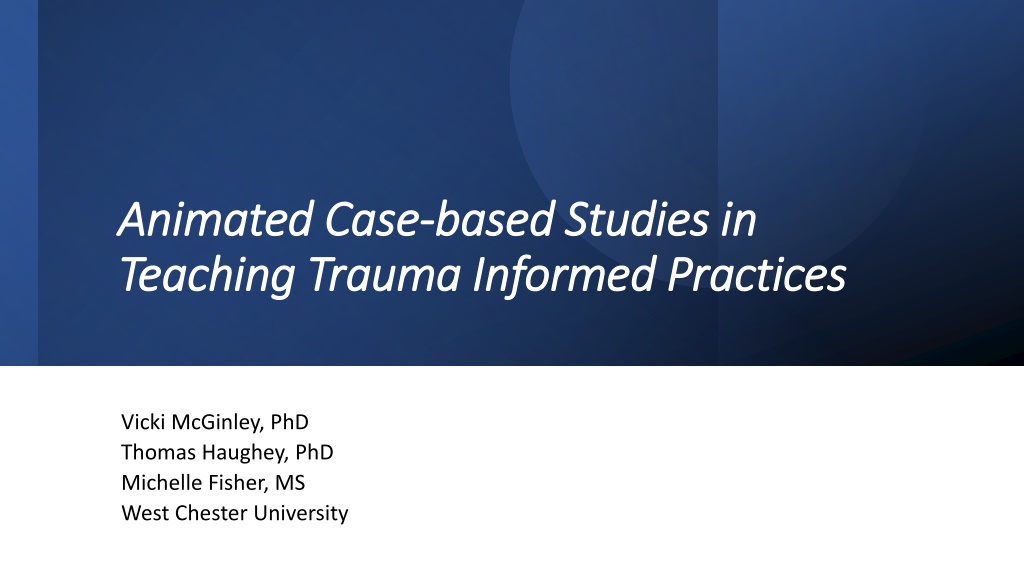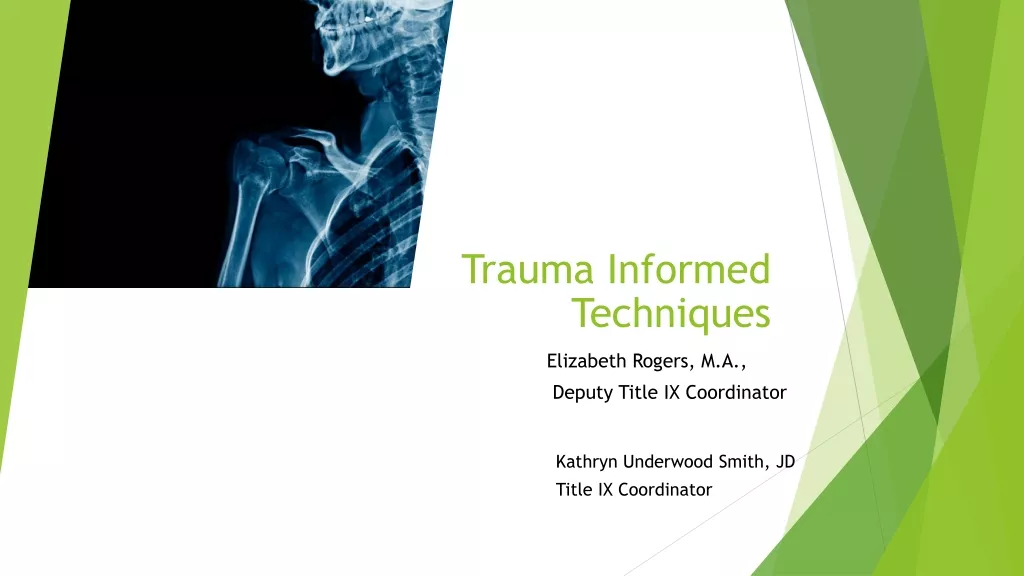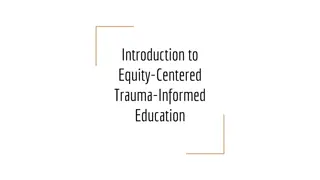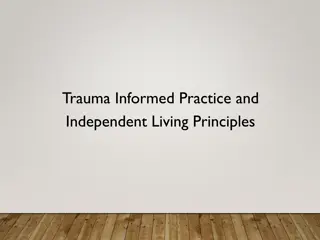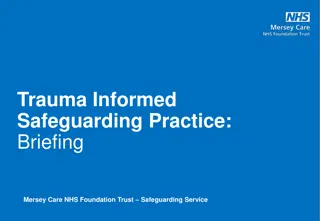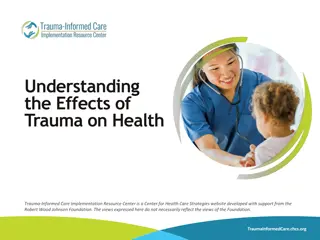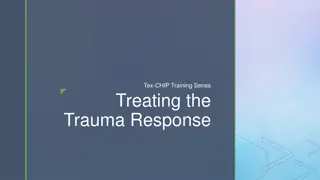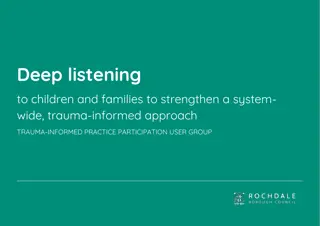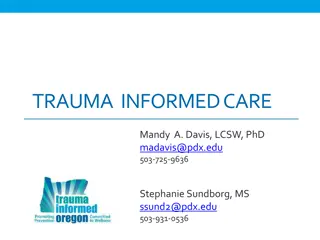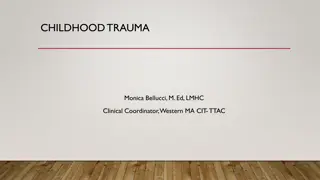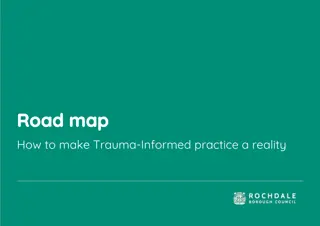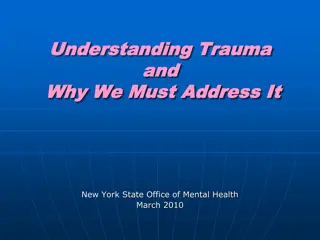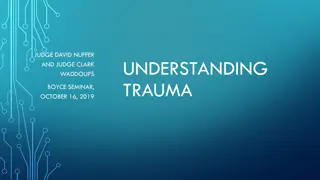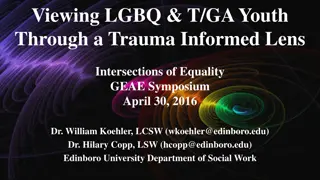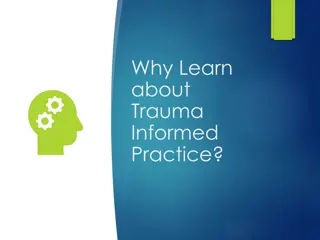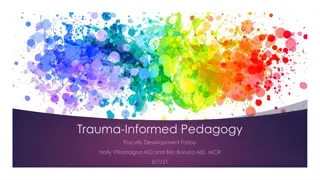Transforming Education with Trauma-Informed Practices
Schools are now required to implement trauma-informed education to address Adverse Childhood Experiences (ACEs). This involves mandatory training for educators, emphasizing the recognition of trauma signs. Case-based learning is highlighted as a valuable method for preservice teachers to develop critical skills and reach diverse populations early in their education careers. Developing trauma-related video case-based animations and involving theatre students in creating digital animations can offer an experiential approach for students to apply trauma-informed practices in real classroom scenarios.
Download Presentation

Please find below an Image/Link to download the presentation.
The content on the website is provided AS IS for your information and personal use only. It may not be sold, licensed, or shared on other websites without obtaining consent from the author.If you encounter any issues during the download, it is possible that the publisher has removed the file from their server.
You are allowed to download the files provided on this website for personal or commercial use, subject to the condition that they are used lawfully. All files are the property of their respective owners.
The content on the website is provided AS IS for your information and personal use only. It may not be sold, licensed, or shared on other websites without obtaining consent from the author.
E N D
Presentation Transcript
Animated Case Animated Case- -based Studies in based Studies in Teaching Teaching Trauma Trauma Informed Practices Informed Practices Vicki McGinley, PhD Thomas Haughey, PhD Michelle Fisher, MS West Chester University
Develop three trauma related video case-based animations. Provide students an experiential approach to apply what they will do in real classroom situations related to trauma. Develop learning activities (e.g., problem-based questions, teaching of a concept, etc.). Involve theatre students in the process in learning to create a character using their voice and in the process of learning how to create digital animation. Create a resource (inhouse, open access content) for faculty and staff around Trauma Informed Practices. Project Objectives
Animated Cases: Andy
Schools are requiring educators to become trauma sensitive and informed, and to incorporate research-based practices within their classrooms that address Adverse Childhood Experiences (Felitti, et al., 1995) it is critical that educators gain those skills and knowledge. Schools must now be able to recognize the signs and symptoms of trauma and integrate that knowledge into education-based policies, learning procedures and practices. During the budget process, legislators combined the bills and incorporated them into Senate Bill 144. Trauma- informed education is now mandatory at all Pennsylvania public schools
The new bill recognizes that Adverse Childhood Experiences (ACEs) tailored to the entire school community. The mandatory training required includes: A minimum of one hour of training on trauma- informed approaches for both newly elected and reelected school board directors. A minimum of one hour of professional development training on trauma-informed approaches. The Pennsylvania Department of Education s PA Leadership Standards must include information on trauma-informed approaches. Senate Bill 144
Case based learning allows preservice teachers to: Research on Case Based Learning Develop critical inquiry and analytical skills. (Gunn and Williams, 2015 and Cho et al., 2015) Apply theory-based knowledge to real world situations prior to in person field experiences or student teaching. (Gravett et al, 2017) Gain access to hard-to-reach populations that they may not have exposure to during field experiences or student teaching. (Billingsly and Scheuermann, 2014)
Can help provide students access to hard-to- reach populations where video cases are not available. (Herbst and Kosko, 2014) Allows faculty members to design the scenario ensuring students are exposed to situations that allow them to apply theory and knowledge (Herbst and Kosko, 2014) Can be as effective as video cases (Moreno et al., 2008) Animated Case Based Learning
EDA324 and EDA524: Trauma Informed Schools and Classrooms Link to 524
Develop storyboards to break up case into scenes Develop or adapt cases Re-write as dialog- based scripts Project Methods Develop draft animation using text to speech audio Screen draft/alpha animation with content experts for authenticity Recruit and hire actors Record audio and connect to animation Edit script as needed
Break scripts down by role Break Narrators were critical Methods: Scripting and Actors Recruit and select Recruit and select actors Vocal performances of challenging characters Record each actor Record Capture character and emotion Each line must be saved individually.
Animated Cases: Kalil
Animated Cases: Kate
References Arrastia-Chisholm, M., Tackett, S., & Torres, K. M. (2021). Case-based instruction in educational psychology: Comparing collaborative and independent approaches. Journal of Research in Education, 30(2), 1 16. Billingsley, G. M., & Scheuermann, B. K. (2014). Using virtual technology to enhance field experiences for preservice special education teachers. Teacher Education and Special Education, 37(3), 255 272. Felitti, V . J. et al., (1998). Relationship of childhood abuse and household dysfunction to many of the leading causes ofdeath in adults: The adverse childhood experiences (ACE) study. American Journal of Preventive Medicine, 14(4), 245-258. Gravett, S., de Beer, J., Odendaal-Kroon, R., & Merseth, K. K. (2017). The affordances of case-based teaching for the professional learning of student-teachers. Journal of Curriculum Studies, 49(3), 369 390. Gunn A.A., & Williams, N. (2015). Using teaching cases to foster a culturally responsive literacy pedagogy. Teacher Education & Practice, 28(1), 45 59. Herbst, P., & Kosko, K. (2014). Using representations of practice to elicit mathematics teachers tacit knowledge of practice: A comparison of responses to animations and videos. Journal of Mathematics Teacher Education, 17(6), 515 537. https://search.ebscohost.com/login.aspx?direct=true&AuthType=sso&db=eue&AN=99372401&site=eds-live&scope=site&custid=s3916018 Pynoos, R. et al., (2008). The National Traumatic Stress Network: Collaborating to improve the standard of care.Professional Psychology: Research and Practice. 39(4), 389-395. Robbins, S. H., Gilbert, K., Chummy, F., & Green, K. B. (2019). The Effects of Immersive Simulation on Targeted Collaboration Skills among Undergraduates in Special Education. Teaching & Learning Inquiry, 7(2), 168 185. https://doi.org/10.20343/teachlearninqu.7.2.11 Shonkoff, J P. et al., (2012). The lifelong effects of early childhood adversity and toxic stress. Retrieved from http:pediatrics.aapublications.org/content/129/1/e232
